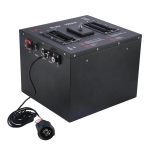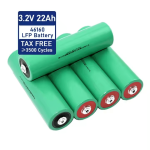When it comes to LiFePO4 vs lithium ion, LiFePO4 is the clear winner. But how do LiFePO4 batteries compare to other rechargeable batteries on the market today?

Lead Acid Batteries
Lead acid batteries may be a bargain at first, but they’ll end up costing you more in the long run. That’s because they need constant maintenance, and you must replace them more often. A LiFePO4 battery will last 2-4x longer, with zero upkeep needed.
Gel Batteries
Like LiFePO4 batteries, gel batteries don’t need frequent recharging. They also won’t lose charge while stored. Where do gel and LiFePO4 differ? A big factor is the charging process. Gel batteries charge at a snail’s pace. Also, you must disconnect them when 100% charged to avoid ruining them.
AGM Batteries
AGM batteries will do plenty of damage to your wallet, and are at high risk for becoming damaged themselves if you drain them past 50% battery capacity. Maintaining them can be difficult as well. LiFePO4 Ionic lithium batteries can be discharged completely with no risk of damage.
A LiFePO4 Battery for Every Application
LiFePO4 technology has proven beneficial for a wide variety of applications. Here’s a few of them:
- Fishing boats and kayaks:Less charging time and longer runtime means more time out on the water. Less weight allows for easy maneuvering and a speed boost during that high-stakes fishing competition.
- Mopeds and mobility scooters:No dead weight to slow you down. Charge to less than full capacity for impromptu trips without damaging your battery.
- Solar setups:Haul lightweight LiFePO4 batteries wherever life takes you (even if it’s up a mountain and far from the grid) and harness the power of the sun.
- Commercial use:These batteries are the safest, toughest lithium batteries out there. So they’re great for industrial applications like floor machines, liftgates, and more.
- Much more: In addition, lithium iron phosphate batteries power many other things. For example – flashlights, electronic cigarettes, radio equipment, emergency lighting and much more.
Safe, Stable Chemistry
Lithium battery safety is important. The newsworthy “exploding” lithium-ion laptop batteries have made that clear. One of the most important advantages LiFePO4 has over other battery types is safety. LiFePO4 is the safest lithium battery type. It’s the safest of any type, actually.
Overall, LifePO4 batteries have the safest lithium chemistry. Why? Because lithium iron phosphate has better thermal and structural stability. This is something lead acid and most other battery types don’t have at the level LiFePO4 does. LiFePO4 is incombustible. It can withstand high temperatures without decomposing. It’s not prone to thermal runaway, and will keep cool at room temperature.
If you subject a LiFePO4 battery to harsh temperatures or hazardous events (like short circuiting or a crash) it won’t start a fire or explode. For those who use deep cycle LiFePO4 batteries every day in an RV, bass boat, scooter, or liftgate, this fact is comforting.
Environmental Safety
LiFePO4 batteries are already a boon to our planet because they’re rechargeable. But their eco-friendliness doesn’t stop there. Unlike lead acid and nickel oxide lithium batteries, they are non-toxic and won’t leak.
You can recycle them as well. But you won’t need to do that often, since they last 5000 cycles. That means you can recharge them (at least) 5,000 times. In comparison, lead acid batteries last only 300-400 cycles.
Excellent Efficiency and Performance
You want a safe, non-toxic battery. But you also want a battery that’s going to perform well. These stats prove that LiFePO4 delivers all that and more:
- Charge efficiency: a LiFePO4 battery will reach full charge in 2 hours or less.
- Self-discharge rate when not in use: Only 2% per month. (Compared to 30% for lead acid batteries).
- Runtime is higher than lead acid batteries/other lithium batteries.
- Consistent power: same amount of amperage even when below 50% battery life.
- No maintenance needed.
Small and Lightweight
Many factors weigh in to make LiFePO4 batteries better. Speaking of weighing–they are total lightweights. In fact, they’re almost 50% lighter than lithium manganese oxide batteries. They weigh up to 70% lighter than lead acid batteries.
When you use your LiFePO4 battery in a vehicle, this translates to less gas usage, and more maneuverability. They are also compact, freeing up space on your scooter, boat, RV, or industrial application.


